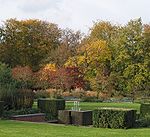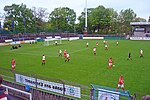Bertelsmann Stiftung
1977 establishments in West GermanyAdvocacy groups in GermanyAll Wikipedia neutral point of view disputesBertelsmannBertelsmann Stiftung ... and 8 more
Foundations based in GermanyPolitical and economic research foundationsPolitical and economic think tanks based in GermanyPolitical and economic think tanks in the United StatesThink tanks based in GermanyThink tanks established in 1977Use American English from June 2017Wikipedia neutral point of view disputes from January 2022

The Bertelsmann Stiftung is an independent foundation under private law, based in Gütersloh, Germany. It was founded in 1977 by Reinhard Mohn as the result of social, corporate and fiscal considerations. As the Bertelsmann Stiftung itself has put it, the foundation promotes "reform processes" and "the principles of entrepreneurial activity" to build a "future-oriented society."Since 1993, the Bertelsmann Stiftung has held the majority of capital shares in the Bertelsmann Group. It holds 80.9% together with the Reinhard Mohn Stiftung and the BVG Stiftung but has no voting rights.
Excerpt from the Wikipedia article Bertelsmann Stiftung (License: CC BY-SA 3.0, Authors, Images).Bertelsmann Stiftung
Carl-Bertelsmann-Straße, Gütersloh Nordhorn
Geographical coordinates (GPS) Address External links Nearby Places Show on map
Geographical coordinates (GPS)
| Latitude | Longitude |
|---|---|
| N 51.908333333333 ° | E 8.4191666666667 ° |
Address
Bertelsmann Stiftung
Carl-Bertelsmann-Straße 256
33335 Gütersloh, Nordhorn
North Rhine-Westphalia, Germany
Open on Google Maps






